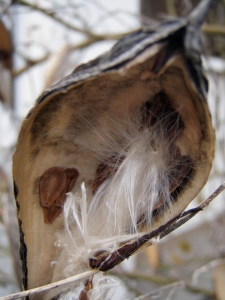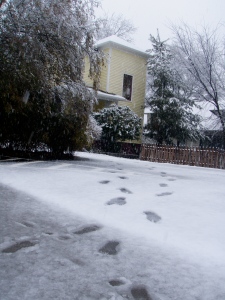A bluebird in an old hamster cage
February 18, 2009
I grew up in a neighborhood called Laurelwood in Brentwood, Tennessee.
The Little Harpeth River ran through my backyard. We had a deck with a grill on it and a mysterious rock wall cutting the backyard in half. I speculated whether it was built by Scotch-Irish immigrants or during the Civil War. I climbed the walnut, locust, and peach trees in the backyard and the green ash in the front.
My best friend Hunter lived three doors down, so in the summer and on warm days after school, I would grab my Abu Garcia fishing rod with a Shimano reel-I was very proud of it-and a small tacklebox with a Rooster Tail in the grasshopper pattern and some Panther Martins for backup and would walk down the street to his house. We knew the river for about a mile in either direction. Going to the left took us into Derby Glen, Belle Rive, and River Oaks. To the right took us through the backyards of our neighborhood and eventually to Wildwood, the neighborhood swim and tennis club.
Fun-Dip and Suicides
Wildwood was less than a mile away by bike. The grill next to the pool sold curly fries, Fun-Dip, and orange sherbert push-up pops. I learned how swim and how to play ping-pong and tennis there. I had crushes on some of the pretty lifeguards. I hated getting out of the pool at “rest period,” when only the kids sixteen years and older could swim. I witnessed my first act of pure cruelty in the section of the Little Harpeth behind the club. Two or three boys were catching crawdads and tearing their claws off for no particular reason.
Our church was another quarter mile past Wildwood. Three or four baseball diamonds surrounded it. Playing in a game on Saturday afternoon got you a free coke and candy from the concession stand. I always ordered a “suicide”-a combination of Coke, Sprite, Dr. Pepper, Orange Fanta, and Mountain Dew-and one of Willy Wonka’s finest creations-Runts, Gobstoppers, Nerds, or Spree.
She never told them
Many kind people lived in our neighborhood. Mrs. McCarty gave me piano lessons. She always complimented me, even though she must have known I never practiced, and she let me keep their dog when they went on vacation. She overpaid me every time. Mrs. Culp was an older woman whose house sat above one of the best bass holes in the creek. Her Jack Russell terrier, Bitsy, barked at us nonstop. Mrs. Culp would come apologize and offer us frozen Girl Scout cookies. She must have been lonely after her husband died. The Dinglers lived next door to Hunter. Their daughter Molly was a year older than us. They always let us and our other friend Michael lower their basketball goal to play “dunk ball.” Michael accidentally broke the rim off the backboard, but they weren’t as angry as we anticipated.
I knew the Harrells, Marshes, Hodges, Bradfords, Nixons, Ewings, Harrises, Dinglers, Haglands, Pattersons, Craces, and Gaineses. Apparently, Laurelwood was a hamlet for people of English descent. I avoided the anonymous woman who had curly black hair with gray streaks and was always out walking her two black Labs. She caught Hunter stuffing with firecrackers a bird we’d shot with our BB guns. We wanted to see what would happen. I knew our parents would have disliked what we were doing. We would have gotten in trouble, but for some reason, she never told them.
Life Together
To me, a neighborhood was a place where my dad could borrow a wheelbarrow from Mr. Bradford. A place where, after Hunter and I collided on our bikes, Mrs. Dingler ran out of her house to help, as if we were her children. A weird lady who knew about endangered species of sparrows could prick our consciences: we should not destroy life simply because we could.
In our neighborhood, I rode my bike with no hands from the Wildwood to the “dead end.” I trick-or-treated with friends. I rafted on pool floats in our flooded creek. I caught a bluebird in an old hamster cage.
A neighborhood was a place where people cared for one another, no matter what their differences in race, religion, or creed were. A place full of contradictions: people waved for me to slow down when I was driving too fast, but their teenage children smashing our pumpkins. Even as I write this, I am aware of the homogeneity of Laurelwood. My neighborhood was an imperfect place full of wonders and disappointments. People lived life together because they somehow sensed that imperfect and often annoying people made for a richer life than a one lived in convenient isolation.